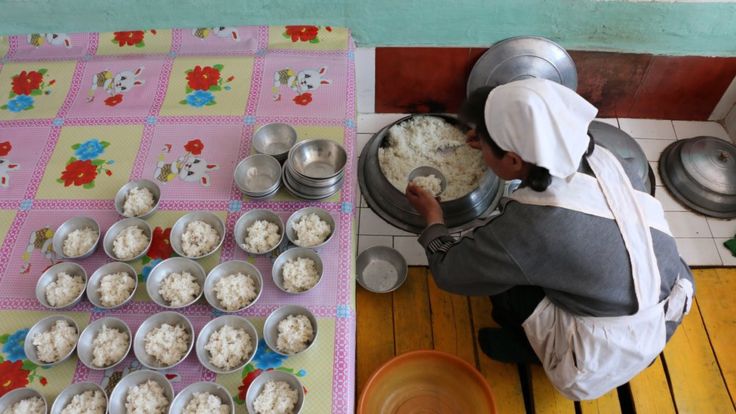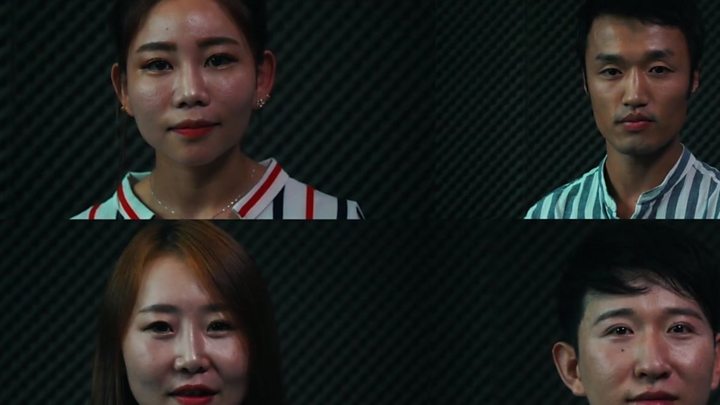North Korea: UN gains 'unprecedented access' during visit - BBC News
North Korea: UN gains 'unprecedented access' during visit
12 May 2018
 Image copyrightWFP/SILKE BUHRImage captionPeople are going hungry in North Korea, the head of the WFP said, but are not starving
Image copyrightWFP/SILKE BUHRImage captionPeople are going hungry in North Korea, the head of the WFP said, but are not starvingThe head of the UN's World Food Programme (WFP) believes there is a "sense of optimism" among North Korea's leaders after enjoying what he said was unprecedented access to the country.
David Beasley spent two days in the capital, Pyongyang, and two outside it, accompanied by government minders.
He said the country was working hard to meet nutritional standards, and hunger was not as high as in the 1990s.
"There is a sense of turning a new page in history," he told the BBC.
Relations between North Korea and the rest of the world have seen a dramatic shift.
Last year the North Korean government carried out a string of nuclear and missile tests.
But next month, its leader Kim Jong-un will meet US President Donald Trump, in what would be the first time a sitting US president has ever met a North Korean leader.
Confirmation of the meeting came after landmark talks between North and South Korea. Mr Trump announced the details of the meeting - in Singapore on 12 June - earlier this week, hours after he welcomed home three US detainees released from North Korea.
Will historic summit lead to peace?
The Koreas - the basics explained
What did the UN see in North Korea?
David Beasley visited North Korea from 8-11 May. The visit included trips to WFP-funded projects - a children's nursery in South Hwanghae province and a fortified biscuit factory in North Pyongyan province.
He told the BBC's Radio 4 programme Today that the farming he saw in the countryside reflected the fact that only about a fifth of the land is arable.
"One of the most powerful things that I saw was out in the countryside - it's spring, they're planting - there's not mechanisation, you've got oxen pulling ploughs, men and women in the fields," he said.
 Image copyrightWFP/SILKE BUHRImage captionDavid Beasley visited WFP programmes in the North Korean countryside
Image copyrightWFP/SILKE BUHRImage captionDavid Beasley visited WFP programmes in the North Korean countryside"It's very structured, very organised, every foot and inch of dirt is being toiled with rakes and hoes and shovels and they're literally planting crops up to the edge of the road, down embankments, using every available space, because it is a land that's mostly mountainous.
"I didn't see starvation like you had in the famine back in the 1990s, that's the good news. But is there a hunger issue, is there under-nutrition? There's no question about it."
Between 1994 and 1998, hundreds of thousands of people are believed to have died in North Korea in a widespread famine.
After drought last year, the UN said seven in 10 North Koreans were relying on food aid, while four in 10 were malnourished.
Two in five N Koreans 'undernourished'
UN sounds alarm over N Korea drought
Last month the UN requested $111m in aid funding to help people in North Korea. The US has offered to help rebuild the country, on condition of denuclearisation.
How do North and South Korean economies compare?
Daily life in the two countries couldn't be more different.

Media captionFour defectors talk about what life is like in North Korea
After the end of the Korean war in 1953 the South, an ally of the US, embraced a capitalist philosophy. It has developed into one of Asia's most affluent nations.
A government-sponsored industrial push in the 1960s led to huge corporations like Samsung and Hyundai being created.

Key figures:
Population: 51.2m in South Korea; 25.4m in North Korea
GDP: $1.4tn - South Korea; less than $20bn - North Korea
Life expectancy: 82 years - South Korea; 70 years - North Korea

South Korea is one of the world's top 20 economies, with GDP of $1.4tn (£1tn).
By contrast, North Korea's GDP is less than $20bn, placing it well outside the top 100 economies.
Reality Check: How North Korea does business
North Korea crisis in 300 words
It has a communist system, but capitalism is creeping into the country.
There are things to buy - but only for some people, those who have money. The majority of people in North Korea live in poverty.
Kim Jong-un has made clear that development is a priority.
Related Topics
North Korea
Share this story About sharing
Messenger
US offers to help rebuild N Korea economy if it denuclearises
12 May 2018
Koreas summit: Will historic talks lead to lasting peace?
28 April 2018
Trump-Kim Jong-un summit set for Singapore on 12 June
10 May 2018
Korean meeting: How did we get here?
28 April 2018
North Korea hunger: Two in five undernourished, says UN
22 March 2017
North Korea drought: Children at risk in 'worst crisis since 2001'
20 July 2017
Asia